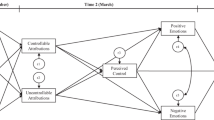Abstract
Research in female achievement and attribution behavior has frequently produced inconsistent and contradictory data. The inconclusive results may be partially due to the consideration of females as a homogeneous group. The present study separated college women on the basis of their achievement level (i.e., over- and underachievement) and sex-role orientation into four groups and examined within-sex differences in attributions. Women who were androgynous and high in achievement level tended to attribute their academic success more to ability than did the other three groups. When the relative usage of ability and effort was examined, women attributed their academic success to effort more than to ability. Differences in the usage of ability and effort attributions, however, were not related to differences in the women's actual achievement performance.
Similar content being viewed by others
References
Alper, T. G. The relationship between role-orientation and achievement motivation in college women. Journal of Personality 1973, 41 9–31.
Atwell, C. R., & Wells, F. L. Wide range multiple-choice vocabulary test. Journal of Applied Psychology 1937, 21 550–555.
Bar-Tal, D., & Frieze, I. Achievement motivation for males and females as a determinant of attributions for success and failure. Sex Roles 1977, 3 301–313.
Bem, S. L. The measurement of psychological androgyny. Journal of Consulting and Clinical Psychology 1974, 42 155–162.
Blishen, B. A socioeconomic index for occupations in Canada. Canadian Review of Sociology and Anthropology 1967, 4 41–53.
Broverman, I. K., Vogel, S. R., Broverman, D. M., Clarkson, F. E., & Rosenkrantz, P. S. Sex-role stereotypes: A current appraisal. Journal of Social Issues 1972, 28 59–78.
Elig, T., & Frieze, I. A multi-dimensional scheme for coding and interpreting perceived causality for success and failure events: The coding scheme of perceived causality (CSPC). JSAS Catalog of Selected Documents in Psychology 1975, 5 313.
Elig, T., & Frieze, I. Measuring casual attributions for success and failure. Journal of Personality and Social Psychology 1979, 37 621–634.
Epstein, C. R. Women's place: Options and limits in professional careers. Berkeley: University of California Press, 1971.
Feather, N. T. Attribution of responsibility and valence of success and failure in relation to initial confidence and perceived locus of control. Journal of Personality and Social Psychology 1969, 13 129–144.
Frieze, I. H. Studies of information processing and the attributional process in achievement-related contexts. Unpublished doctoral dissertation, University of California at Los Angeles, 1973.
Frieze, I. H. Causal attributions and information seeking to explain success and failure. Journal of Research in Personality 1976, 10 293–305.
Frieze, I. H. Internal and external psychological barriers for women in science. In J. A. Ramaley (Ed.), Covert discrimination and women in the sciences (AAAS Symposium Series). Boulder, Colorado: Westview Press, 1978.
Frieze, I. H., Fisher, J., Hanusa, B., McHugh, M. C., & Valle, V. A. Attributions of the causes of success and failure as internal and external barriers to achievement in women. In J. Sherman & F. Denmark (Eds.), Psychology of women: Future directions of research. New York: Psychological Dimensions, 1978.
Gaudreau, P. Factor analysis of the Bem Sex Role Inventory. Journal of Consulting and Clinical Psychology 1977, 45 299–302.
Hoffman, L. W. The employment of women, education and fertility. Merrill-Palmer Quarterly 1974, 20 99–119.
Horner, M. S. Sex differences in achievement motivation and performance in competitive and non-competitive situations (Doctoral dissertation, University of Michigan, 1968). Dissertation Abstracts International 1969, 30 407B.
Kukla, A. Attributional determinants of achievement-related behavior. Journal of Personality and Social Psychology 1972, 21 166–174.
Luginbuhl, J. E., Crowe, D. H., & Kahan, J. P. Causal attributions for success and failure. Journal of Personality and Social Psychology 1975, 31 86–93.
McMahan, I. D. Relationships between causal attributions and expectancy of success. Journal of Personality and Social Psychology 1973, 28 108–114.
Nicholls, J. G. Causal attributions and other achievement-related cognitions: Effects of task outcome, attainment value, and sex. Journal of Personality and Social Psychology 1975, 31 379–389.
Parsons, J. E., Ruble, D. N., Hodges, K. L., & Small, A. W. Cognitive-developmental factors in emerging sex differences in achievement-related expectancies. Journal of Social Issues 1976, 32 47–62.
Peplau, L. A. Impact of fear of success and sex-role attitudes on women's competitive achievement. Journal of Personality and Social Psychology 1976, 34 561–568.
Simon, J. G., & Feather, N. T. Causal attributions for success and failure at university examinations. Journal of Educational Psychology 1973, 64 45–56.
Stein, A. H., & Bailey, M. M. The socialization of achievement orientation in females. Psychological Bulletin 1973, 80 345–365.
Waters, C. W., Waters, L. K., & Pincus, S. Factor analysis of masculine and feminine sex-typed items from the Bem Sex Role Inventory. Psychological Reports 1977, 40 567–570.
Weiner, B., Frieze, I., Kukla, A., Reed, L., Rest, S., & Rosenbaum, R. M. Perceiving the causes of success and failure. New York: General Learning Press, 1971.
Wiegers, R. M., & Frieze, I. H. Gender, female traditionality, achievement level, and cognitions of success and failure. Psychology of women Quarterly 1977, 2 125–137.
Author information
Authors and Affiliations
Rights and permissions
About this article
Cite this article
Crombie, G. Women's attribution patterns and their relation to achievement: An examination of within-sex differences. Sex Roles 9, 1171–1182 (1983). https://doi.org/10.1007/BF00303100
Issue Date:
DOI: https://doi.org/10.1007/BF00303100




